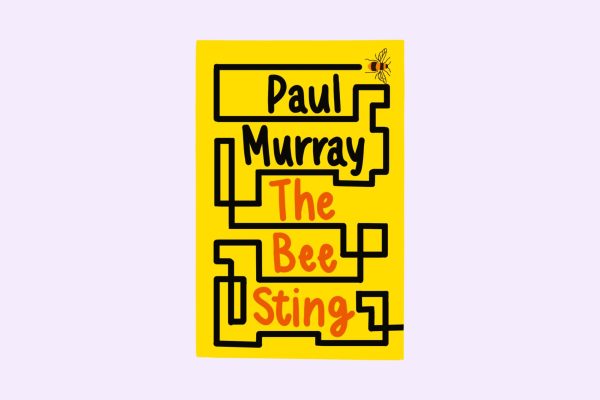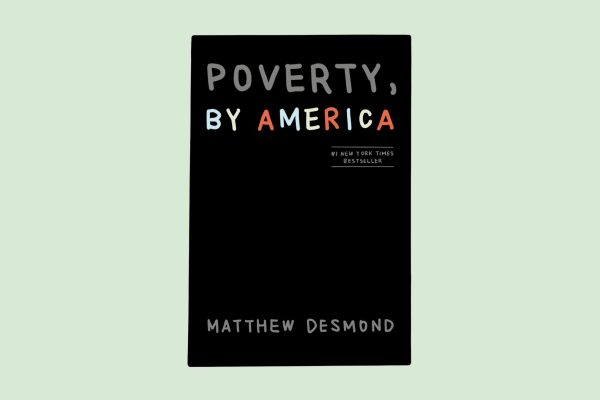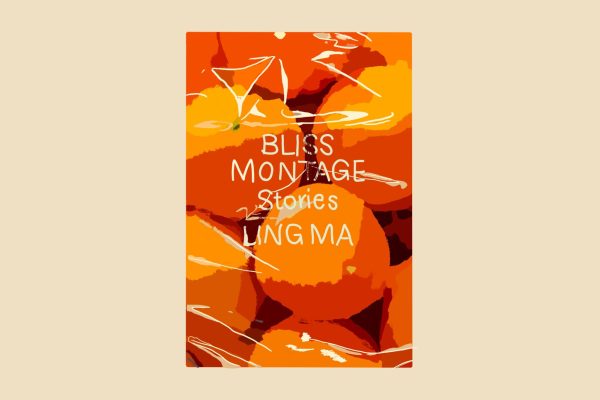“The Bee Sting” by Paul Murray
— Emily Genova, Deputy Managing Editor

This nearly 700-page novel follows an Irish family as they reckon with a failing family-run car business in a small, gossipy town. Told in alternating points of view, Paul Murray’s “The Bee Sting” drops the reader into the life of the Barnes family, jumping between timelines and each member of the family’s inner conflicts. We learn to understand the secrets within the parents’ marriage, and follow the children Cassie and PJ as they navigate relationships, school and coming of age.
I started this book on my Kindle during my flight to spring break and expected to finish on the beach, not anticipating the monstrosity of the novel that it is. I warn that this is not a beach read — the mother, Imelda’s, point of view is written without any type of punctuation — but instead a deep dive into the history and secrets of a family that is falling apart. This novel was hilarious, touching and heartbreaking. I love Irish literature and books that feel as though I’m reading about someone’s life, and the chaotic imperfectness that is the Barnes family and “The Bee Sting” was no exception.
“Poverty, by America” by Matthew Desmond
— Krish Dev, Multimedia Editor

Pulitzer Prize-winning sociologist Matthew Desmond returns to writing with a simple question: Why does the United States, the world’s wealthiest nation, have a higher poverty rate than any comparable democracy? His 2023 book, “Poverty, by America,” seeks to find the root causes of this quintessential American paradox.
While Desmond’s book includes research from sociology, economics and politics, he also includes anecdotal observations. The combination of empathetic writing backed with extensive data results in a thought-provoking thesis: financially stable Americans, even those with progressive values, profit from government policies that perpetuate poverty. Desmond argues that to understand the issue of poverty we — “the secure, the insured, the housed, the college educated, the protected, the lucky” — must confront the uncomfortable reality of our complicity.
Ultimately, Desmond discusses concrete policy proposals, such as empowering the poor in the housing market and ensuring the rich pay their fair share of taxes. However, he also asks us to become “poverty abolitionists,” which means “unwinding ourselves from our neighbors’ deprivation and refusing to live as unwitting enemies of the poor.” I highly recommend the book for anyone interested in learning more about the pervasive issue of poverty in the United States, especially because it forces us to examine the way we are all connected to the roots of the issue.
“Bliss Montage” by Ling Ma
— Ella Sabrina Malabanan, Contributing Writer

“Bliss Montage” is Ling Ma’s masterful collection of eight inventive and wonderfully absurd short stories. Known for her 2018 novel, “Severance,” Ma is an expert at crafting surrealist fiction that deconstructs the mundane. Despite the stories’ widely different subject matters — from a professor with a portal in his office to a woman abandoning her cryogenically frozen husband — the collection remains unified by its unnerving exploration of the everyday.
Although Ma’s short stories are very high concept and bizarre, they are still incredibly intimate and filled with a sense of yearning. My favorite short story in the collection is “G,” a dizzying tale about two best friends who go on a bender with a drug that makes you invisible. What starts as a fun trippy story turns into a haunting exploration of Asian American identity, female friendship and the desire to disappear.
While many short story collections — even the ones I love — occasionally have one that falls flat, this is not the case with “Bliss Montage.” Like a no-skip album, all eight stories sing in their own way. One particularly memorable story is “Yeti Lovemaking,” which is exactly what it sounds like. While its title accurately forewarns its subject matter, it still managed to surprise me with how it uses its absurd premise to explore broken relationships and big life transitions.
“The Virgin Suicides” by Jeffrey Eugenides
— Alexa Donovan, Deputy Arts Editor

Content warning: This review contains mentions of suicide.
“‘Obviously, Doctor,’ she said, ‘you’ve never been a thirteen-year-old girl.’”
I am around 30 years late to recognizing Jeffrey Eugenides’ “The Virgin Suicides” as a masterpiece, but this is certainly a case where the phrase “better late than never” rings true. The novel explores the story of the Lisbon sisters’ lives through a voyeuristic, teenage male perspective.
A group of young men are obsessed with the beautiful and mysterious allure of the Lisbon sisters, whose parents have them cut off from the outside world of 1970s suburbia. The boys, and subsequently, the entire town, are even more invested in these young women when one of the sisters, Cecilia, tries to kill herself at the start of the book. We follow the family’s fallout after this attempt, and watch as the boys— overflowing with hormones — try to put some pieces together on their own. Eventually, readers find themselves mourning all five sisters who, after grappling with the hardships of girlhood, make an apparent suicide pact over a few short months.
I, like Emily, brought this with me to the beach over spring break. It certainly was not the correct vibe for vacation, but I finished it in less than a day. Eugenides, who won a Pulitzer for his novel “Middlesex ” in 2002, is an extremely talented writer. It felt like every single sentence in the book was mulled over and carefully crafted. Though readers never truly understand what happened exactly, the writing makes up for this, and left me with a satisfying sense of mystery and esotericism. Thirty one years after its release and one very popular movie adaptation later, the book is considered a modern classic, and I understand why.
Contact the Arts Desk at [email protected].

























































































































































